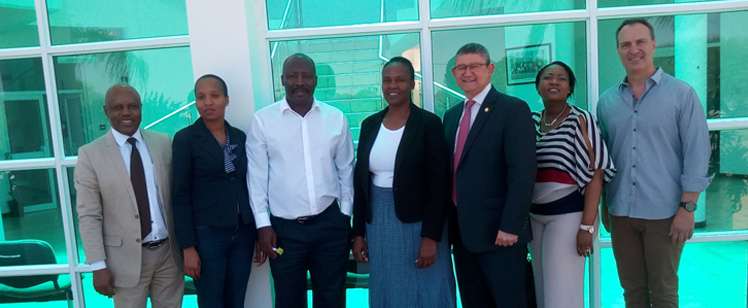-
CUT Delegation visits NFTRC
Central University of Technology (CUT) last week visited National Food Technology Research Centre (NFTRC). The delegation consisted of seven officials from CUT in the Free State, South Africa, and two from the Botswana Institute for Technology Research and Innovation (BITRI).
The purpose of their visit was to familiarise themselves with what NFTRC does, including its products and services. NFTRC’s Acting Director of Research and Development, Dr Bernard Bulawayo presented to the delegation on the organisation’s mandate, and what each Research and Development department does as a way of contributing to the mandate.

Dr Bulawayo elaborated on NFTRC’s Test Beds, whose purpose is for Batswana to produce small test batches for market-testing. He said the Test Beds will help Batswana to get feedback regarding their products, hence allowing them to make informed business decisions.
Dr Bulawayo stated that NFTRC also hosts students from different universities, including international ones, to do their attachments here. He said he was hoping to see students from CUT doing their industrial attachments here in the future.
Meanwhile, Professor Ryk Lues from CUT Centre for Applied Food Safety and Biotechnology (CAFSaB) in the Department of Life Sciences said he had noted that one of the core values of NFTRC is to recognise employees as its best asset, which is the same value they have at CUT. He indicated that before everything else employees have to be recognised, because they are the ones who drive the mandate of organisations.
Professor Lues presented on what their institution does, indicating that their special fields at CAFSaB include food safety education, waste-to-renewables, food-efficient biotechnology, behaviours and management systems in formal and informal settings, among others.
He further said that they are currently working on a project focusing on determining the safety, storage conditions and nutritional aspects of foodstuffs provided in schools in the Free State.
Professor Lues said another project they are working on is determining the Nutrition of Food Served in HIV/AIDS Hospices in the Eastern Cape and Northern Cape South Africa.
He further presented on the bioreactor setup, which produces good biogas from a mixture of cow dung, blood and intestines which are acquired from abattoirs.
Professor Lues concluded by thanking NFTRC for hosting them, and stated that he would really like to collaborate if NFTRC is willing, and would like to see NFTRC also hosting their students.
The visit was concluded with a tour of NFTRC laboratories, where the delegates showed much interest in the Gas Chromatography machine at the Food Chemistry Laboratory (FCL); they were interested in knowing if NFTRC has somebody who does the maintenance of the equipment, or they outsourced from outside. When answering the question, Head of FCL Dr Boitshepo Keikotlhaile said that maintenance and calibration of equipment is done by the suppliers.

- mail@naftec.org
- Staff Webmail
- NFTRC Library
- Contact Us
